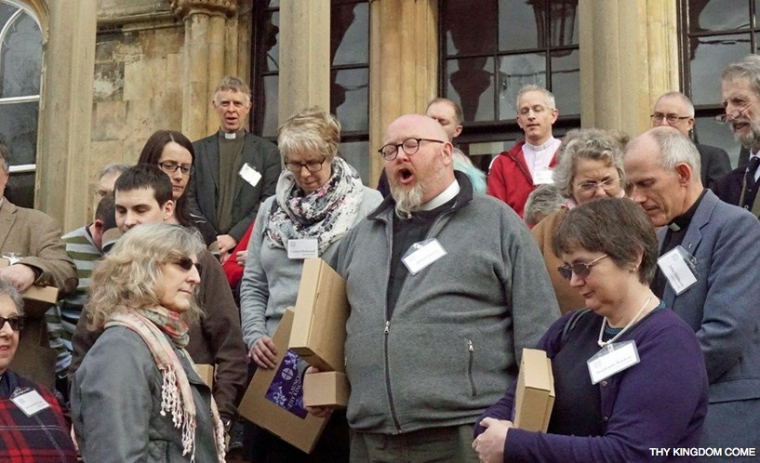Angela Tilby's strange attack on evangelicals: a response
There is a somewhat surprising article in the latest edition of the Church of England's biggest-selling weekly newspaper, the Church Times.
The item is entitled 'Deliver us from the evangelical takeover' and is written by Angela Tilby, a canon emeritus of Christ Church, Oxford. It quickly became the most-viewed feature on the paper's subscription-based website. The article starts with a recent report which described doctors in the UK as the country's 'new clergy' attending to people's spiritual needs. Tilby then goes on to remark that this situation has arisen despite the fact that there is 'no shortage of talk about mission and outreach' in the Church of England. The implication is that such 'talk' has plainly failed to affect the country – otherwise, why would people be taking spiritual needs to GPs?

She continues by highlighting the archbishops' prayer initiative 'Thy Kingdom Come' as an example of the sort of 'talk' she has in mind. 'The underlying theology,' she writes, is 'that of individuals letting Jesus into their hearts and lives one by one. There is nothing wrong with that, of course; but it worries me that the Church of England is being driven by the assumption that there is simply no other way of speaking of the Christian faith.' She adds: 'The culture of Thy Kingdom Come is that of transatlantic Evangelicalism filtered through the public-school system, HTB, New Wine, and the other familiar networks... It will soon simply be the Church of England, thanks in part to the mixture of innocence and gullibility which characterises its appeal.' And so she concludes by saying that her participation in this prayer initiative will consist of 'praying for an escape from the Evangelical takeover of the Church'.
Now some evangelicals, of course, have abandoned that label in recent years. Partly this is due to its unfortunate association with Donald Trump. But I think that, rightly understood, the term 'evangelical' still has value. The key is to remember that in its truest sense it does not refer to a particular worship style, nor a specific brand of politics. Rather, it is all about an understanding of the 'good news' of the gospel which aims to be based on what Jesus taught about Scripture and its authority in matters of faith. So how do I, as one such evangelical, seek to respond to Canon Tilby?
1. With contrition. It sounds as though Angela Tilby has felt quite bruised and damaged by some whom she rightly or wrongly regards as evangelicals. If that is the case, I am truly sorry to hear that, and hope she feels able to forgive us.
2. With confusion. There are a number of misunderstandings in her article.The suggestion that 'Thy Kingdom Come' is 'transatlantic Evangelicalism' is an assertion for which it is hard to find evidence; indeed some evangelicals have reservations about what is perceived as its Anglo-Catholic content! Furthermore, there is no 'evangelical takeover' of the Church of England: most evangelicals of all shades whom I know are desperate for more bishops who will articulate evangelical Anglican values with confidence. And recent synod debates have shown evangelicals to be in a minority.
3. With compassion. Angela Tilby expresses concerns about how 'people in distress are patronised by the saved and the certain, infantilised by a faux inclusivity that has them playing with tea lights and cutting out little paper flames, while they are jollied along to find Jesus over (excellent) coffee'. If this is true then we need to learn more emotional intelligence and compassion. At the same time, one trusts that Canon Tilby has done the compassionate thing also – talking with individual clergy, in the relevant churches, about the specific cases of 'people in distress' she has in mind. Otherwise, she is just tilting at windmills.
4. With concern. Canon Tilby's seemingly reluctant concession that there is 'nothing wrong' with 'individuals letting Jesus into their lives' is concerning. The biblical pictures of a Jesus who 'stands at the door and knocks' and who 'will dwell in your hearts through faith' are matters of wonder and joy rather than grudging toleration! Of course, there are many ways that people come to this place of decision; some may well not remember precisely when. But the gospel becomes powerful for someone when it becomes personal.
5. With confidence. Canon Tilby laments 'the abandonment of traditional religion, with its...slow nurturing of the person through unconsciously memorised texts'. The irony is that the 1662 Prayer Book, to which she seems to be referring, is thoroughly evangelical in theology. Perhaps the issue is less an 'evangelical takeover' than what many perceive as a drift from Anglicanism's historic evangelical roots. Either way, evangelicals can be confident that the C of E's 'traditional religion' is firmly evangelical – when that word is rightly understood.
It is always difficult to be on the receiving end of rather strange attacks such as this one. But however else we respond, let's pray for Canon Tilby to be blessed. Apart from anything else, for evangelicals, that will demonstrate our obedience to the Scriptures we profess to hold so dear.
David Baker is a former daily newspaper journalist now working as an Anglican minister in Sussex, England. Find him on Twitter @Baker_David_A The Rough Guide to Discipleship is a fortnightly series.











